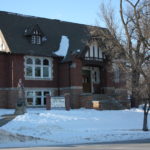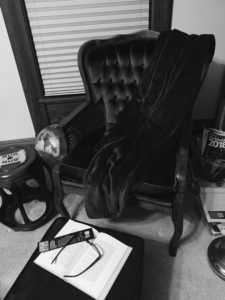If you want to be a naturalist, you should be willing to get outside even when the weather is…less than ideal. Wind, snow, sleet: they’re all part of the experience.
Still. There comes a point each winter when I start to think that the ice, gray skies, and sub-zero temperatures have nothing new to teach me. I have options. I could curl up next to my laptop with a pot of coffee and binge-watch a season of my favorite British TV series.
Better yet, I could slip down the street to the library and learn something new. One of my favorite places to learn something new is in the non-fiction section, where I gravitate to the call numbers 977.5 — Wisconsin history. There I can find books full of things I never knew about the place where I live: descriptions of how this rugged landscape was formed, tales of the first Europeans to venture down across Lake Michigan and of the Native people they found here.
If, like me, you live in a town of fewer than 2,000 souls, you might think that no one would bother to write a book about the place…and you would almost certainly be wrong. Nearly every community has a local historian whose labor of love leads to a book that chronicles hometown events and people, dating back to the first pioneer or plat map. Some of these histories are beautifully written and entertaining. An even greater number, regardless of the writing, are loaded with facts you might not have known about the land around you.
On one of my recent trips to “Non-fiction: 977.5” I discovered two histories of Juneau County and a history of the Wisconsin River by Wisconsin author August Derleth. At a library in Madison (yes, I have multiple library cards) I found a book by Wisconsin’s first surveyor, Increase Lapham, in which he describes the land as he found it then. In the books I brought home, I read about the origin of dams on the various Wisconsin River tributaries that flow through our county, found an 1879 map of Elroy, and learned that in the 1850s fur trader Moses Paquette built one of the region’s last trading posts on the Baraboo River somewhere upstream from my house.
For me, library forays are like treasure hunts. Skip the online catalog and keyword search – I don’t know what I’m looking for because I don’t even know the possibilities. In whatever library I’m visiting, I amble over to the 977 shelf and see what surprises appear. Librarians can help, too; many libraries have a Special Collections room that contains rare books – especially local histories.
So if the weather gets you down, pay a visit to your library. And don’t stop there. Explore the libraries in nearby towns, the local historical society, the university. As for me, I’ll be out on the Baraboo River, looking for the site of an old trading post…after the darned ice melts.


